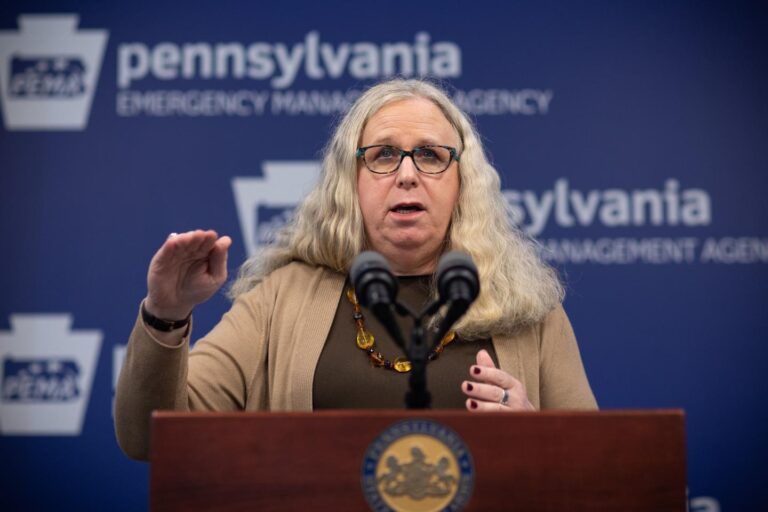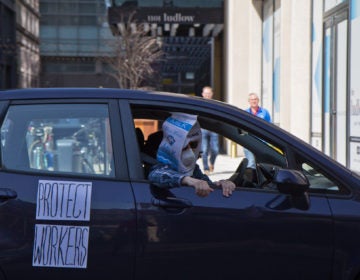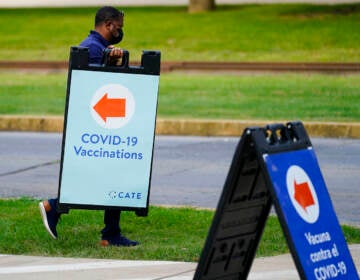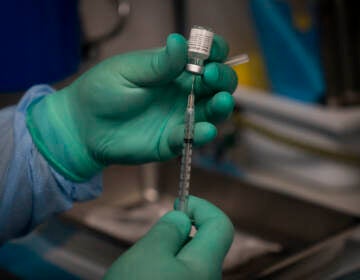Pa. coronavirus update: Comply with contact tracers, health secretary urges
Cases are on the rise. Answer the call and participate in the interview. It’s all confidential, state Health Secretary Rachel Levine says.

Pennsylvania Health Secretary Rachel Levine (Commonwealth Media Services)
Updated at 3:22 p.m.
–
The Pennsylvania Department of Health reported on Thursday 2,202 additional positive cases of COVID-19, bringing the statewide total to 202,876. Daily increases are now comparable with what was seen in April, the department said. Statewide, 44 additional deaths were reported, for a total of 8,762 deaths attributed to COVID-19.
Philadelphia’s Department of Public Health reported 385 additional positive cases Thursday, bringing the number of confirmed cases to 44,139. One additional fatality was confirmed in Philadelphia, for a total of 1,868.
Comply with contact tracers, Levine urges
State Health Secretary Dr. Rachel Levine urged Pennsylvania residents to stay vigilant as COVID-19 cases continue to rise. Almost 50 of the state’s 67 counties have seen an increase in coronavirus cases in the past seven days. Of the hospitalizations in the state, 114 of those patients are on ventilators.
During a press conference Thursday, Levine urged people who are diagnosed with the virus to comply with contact tracers.
“If you test positive and a case investigator reaches out to you, please answer the call to participate in the interview. This interview is completely confidential and anonymous. You could save a life by being honest about who you have been in contact with and the places you have visited,” Levine said.
“Answer the call if a contact tracer reaches out to you. Yes, if you have been in contact with someone who has COVID-19, they may tell you you need to stay home for 14 days. Even if you never get sick, you could save a life by following their directions.”
It’s difficult to predict what future COVID-19 rates will be and what mitigation efforts will be needed, Levine said, but she noted that the state is better prepared to handle the pandemic than it was in the spring. That includes increasing testing, with about 35,000 test results per day, and mass testing in nursing homes, she said.
Levine also called for additional federal funding for the Regional Response Health Collaboration Program, which aims to prevent and respond to COVID-19 in long-term residential care facilities, including long-term care nursing facilities, personal care homes, and assisted living residences.
Other mitigation efforts include limiting how many people eat indoors at restaurants and the size of gatherings.
“As we see the case numbers increase, what we will be watching really carefully are potential downstream impacts. That includes hospitalizations, that includes the number of individuals in intensive care units on a ventilator, we will be watching our PPE,” Levine said.
“We are in a better place than we were in the spring. The intensive care units have improved, we have therapeutics such as remdesiver and dexamethasone. And so, that has improved. Although our death rate is going up slightly, it’s nothing near what it was in the spring,” she said.
At this time, Levine said, the state has no plans to return to the red, yellow and green zones that existed at the beginning of the pandemic to initiate quarantines based on how high cases were in each county.
Much of the current increase in COVID-19 is caused by various types of gatherings, including small gatherings like dinner parties and birthday parties, she said. Because gatherings are a significant culprit in the spread of COVID-19, the holidays will be very different this year, Levine added.
“I understand it is a sacrifice to ask individuals and families not to gather outside the people in their households, but that’s what we’re asking them to do. … As we go into Halloween, Thanksgiving, Christmas, Hanukkah and Kwanzaa, we are asking people to stay in their households and contact their friends and families in a more virtual way. That’s a tremendous sacrifice we are asking people to make, but it’s absolutely necessary during this challenging time,” Levine said.
“I understand people get immune to numbers, but each of those numbers is a person, each of those new cases is someone who now has COVID-19, each of those hospitalizations is someone sitting in a hospital bed that might be on a ventilator, and tragically we are starting to see some more deaths.”

Get daily updates from WHYY News!
Scam targets families receiving benefits for children
The state Department of Human Services is warning the public about a possible scam targeting individuals who receive Pandemic EBT benefits.
The federal program assists families with school-age children who qualify for free and reduced-price meals through the National School Lunch Program and lost access to breakfast and lunch at school because of closures during the pandemic. More than $360 million has been distributed to about 680,000 households to help families feed nearly 1 million children. Families received about $370 per child.
Officials are investigating reports of phone calls made to individuals from a person pretending to be a representative from the County Assistance Office. During the pre-recorded messages, the benefits recipient is advised to provide a Social Security number and case record number to expedite issuance of Pandemic EBT benefits.
The Department of Human Services is urging people to be skeptical of unsolicited or random phone calls or text messages about public assistance programs. The department and other government agencies do not ask for information about P-EBT, SNAP or any other public-assistance programs over phone calls or texts.
“We are all living through difficult times, and unfortunately there are people who will try to take advantage of others who may need help meeting essential needs. Be mindful, stay aware, and if you think something looks off, it probably is,” DHS Secretary Teresa Miller said in a statement Thursday.
Anyone who wants to know if a communication is legitimate should contact the DHS Office of Income Maintenance. The number for Philadelphia residents is 215-560-7226. Residents outside Philadelphia can call 1-877-395-8930.
Anyone who needs help purchasing food can apply for support through the Supplemental Nutrition Assistance Program, known as SNAP, which helps households purchase enough food to avoid going hungry.
WHYY is your source for fact-based, in-depth journalism and information. As a nonprofit organization, we rely on financial support from readers like you. Please give today.




![CoronavirusPandemic_1024x512[1]](https://whyy.org/wp-content/uploads/2020/03/CoronavirusPandemic_1024x5121-300x150.jpg)


